Personal Reflection on Counselling: Assumptions, Values, and Concerns
VerifiedAdded on 2021/01/02
|5
|1192
|78
Homework Assignment
AI Summary
This assignment presents a personal reflection on the role of a counsellor, exploring the author's basic assumptions about people and their capacity for change, as well as their self-described cultural identity and how it influences their approach. The reflection delves into the author's core values and how these impact their perspective as a counsellor, including specific challenges such as marriage counselling within a specific cultural context. The assignment also outlines the author's concerns and anxieties related to counselling work, particularly in determining diagnoses and navigating the complexities of client narratives, alongside their perceived personal strengths like active listening and empathy. Finally, the reflection addresses the division of responsibility between the counsellor and the client, emphasizing ethical considerations and the importance of maintaining professional boundaries.
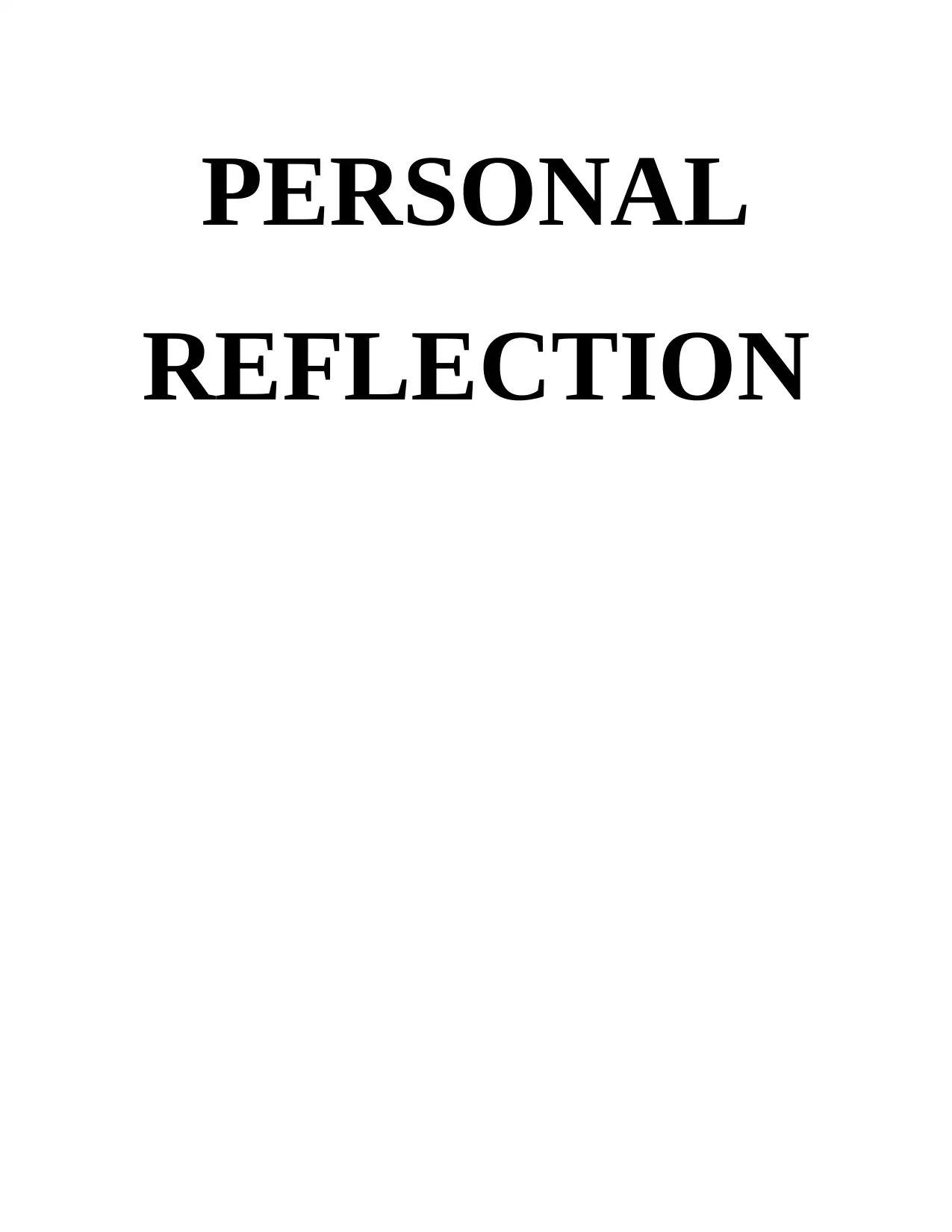
PERSONAL
REFLECTION
REFLECTION
Paraphrase This Document
Need a fresh take? Get an instant paraphrase of this document with our AI Paraphraser
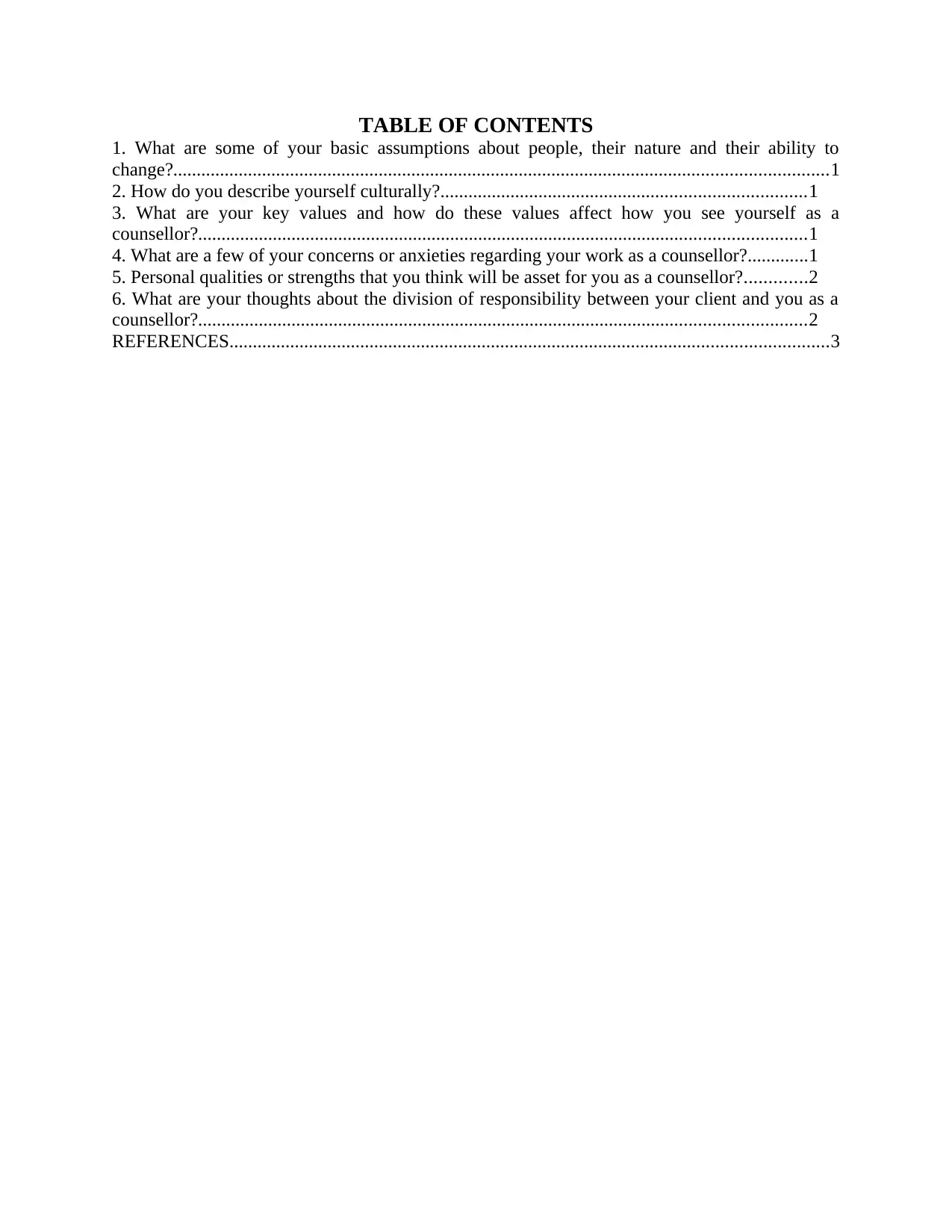
TABLE OF CONTENTS
1. What are some of your basic assumptions about people, their nature and their ability to
change?............................................................................................................................................1
2. How do you describe yourself culturally?..............................................................................1
3. What are your key values and how do these values affect how you see yourself as a
counsellor?..................................................................................................................................1
4. What are a few of your concerns or anxieties regarding your work as a counsellor?.............1
5. Personal qualities or strengths that you think will be asset for you as a counsellor?.............2
6. What are your thoughts about the division of responsibility between your client and you as a
counsellor?..................................................................................................................................2
REFERENCES................................................................................................................................3
1. What are some of your basic assumptions about people, their nature and their ability to
change?............................................................................................................................................1
2. How do you describe yourself culturally?..............................................................................1
3. What are your key values and how do these values affect how you see yourself as a
counsellor?..................................................................................................................................1
4. What are a few of your concerns or anxieties regarding your work as a counsellor?.............1
5. Personal qualities or strengths that you think will be asset for you as a counsellor?.............2
6. What are your thoughts about the division of responsibility between your client and you as a
counsellor?..................................................................................................................................2
REFERENCES................................................................................................................................3
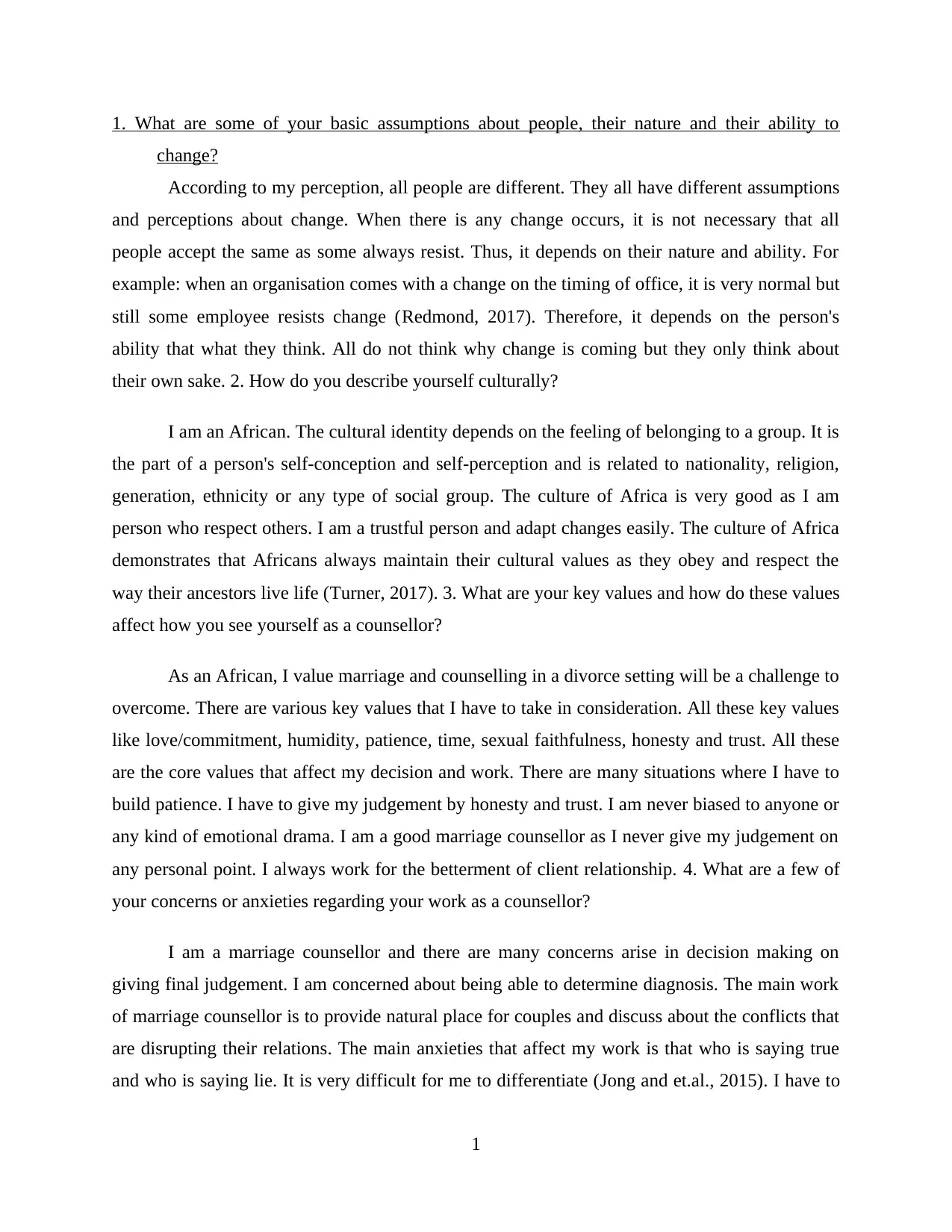
1. What are some of your basic assumptions about people, their nature and their ability to
change?
According to my perception, all people are different. They all have different assumptions
and perceptions about change. When there is any change occurs, it is not necessary that all
people accept the same as some always resist. Thus, it depends on their nature and ability. For
example: when an organisation comes with a change on the timing of office, it is very normal but
still some employee resists change (Redmond, 2017). Therefore, it depends on the person's
ability that what they think. All do not think why change is coming but they only think about
their own sake. 2. How do you describe yourself culturally?
I am an African. The cultural identity depends on the feeling of belonging to a group. It is
the part of a person's self-conception and self-perception and is related to nationality, religion,
generation, ethnicity or any type of social group. The culture of Africa is very good as I am
person who respect others. I am a trustful person and adapt changes easily. The culture of Africa
demonstrates that Africans always maintain their cultural values as they obey and respect the
way their ancestors live life (Turner, 2017). 3. What are your key values and how do these values
affect how you see yourself as a counsellor?
As an African, I value marriage and counselling in a divorce setting will be a challenge to
overcome. There are various key values that I have to take in consideration. All these key values
like love/commitment, humidity, patience, time, sexual faithfulness, honesty and trust. All these
are the core values that affect my decision and work. There are many situations where I have to
build patience. I have to give my judgement by honesty and trust. I am never biased to anyone or
any kind of emotional drama. I am a good marriage counsellor as I never give my judgement on
any personal point. I always work for the betterment of client relationship. 4. What are a few of
your concerns or anxieties regarding your work as a counsellor?
I am a marriage counsellor and there are many concerns arise in decision making on
giving final judgement. I am concerned about being able to determine diagnosis. The main work
of marriage counsellor is to provide natural place for couples and discuss about the conflicts that
are disrupting their relations. The main anxieties that affect my work is that who is saying true
and who is saying lie. It is very difficult for me to differentiate (Jong and et.al., 2015). I have to
1
change?
According to my perception, all people are different. They all have different assumptions
and perceptions about change. When there is any change occurs, it is not necessary that all
people accept the same as some always resist. Thus, it depends on their nature and ability. For
example: when an organisation comes with a change on the timing of office, it is very normal but
still some employee resists change (Redmond, 2017). Therefore, it depends on the person's
ability that what they think. All do not think why change is coming but they only think about
their own sake. 2. How do you describe yourself culturally?
I am an African. The cultural identity depends on the feeling of belonging to a group. It is
the part of a person's self-conception and self-perception and is related to nationality, religion,
generation, ethnicity or any type of social group. The culture of Africa is very good as I am
person who respect others. I am a trustful person and adapt changes easily. The culture of Africa
demonstrates that Africans always maintain their cultural values as they obey and respect the
way their ancestors live life (Turner, 2017). 3. What are your key values and how do these values
affect how you see yourself as a counsellor?
As an African, I value marriage and counselling in a divorce setting will be a challenge to
overcome. There are various key values that I have to take in consideration. All these key values
like love/commitment, humidity, patience, time, sexual faithfulness, honesty and trust. All these
are the core values that affect my decision and work. There are many situations where I have to
build patience. I have to give my judgement by honesty and trust. I am never biased to anyone or
any kind of emotional drama. I am a good marriage counsellor as I never give my judgement on
any personal point. I always work for the betterment of client relationship. 4. What are a few of
your concerns or anxieties regarding your work as a counsellor?
I am a marriage counsellor and there are many concerns arise in decision making on
giving final judgement. I am concerned about being able to determine diagnosis. The main work
of marriage counsellor is to provide natural place for couples and discuss about the conflicts that
are disrupting their relations. The main anxieties that affect my work is that who is saying true
and who is saying lie. It is very difficult for me to differentiate (Jong and et.al., 2015). I have to
1
⊘ This is a preview!⊘
Do you want full access?
Subscribe today to unlock all pages.

Trusted by 1+ million students worldwide
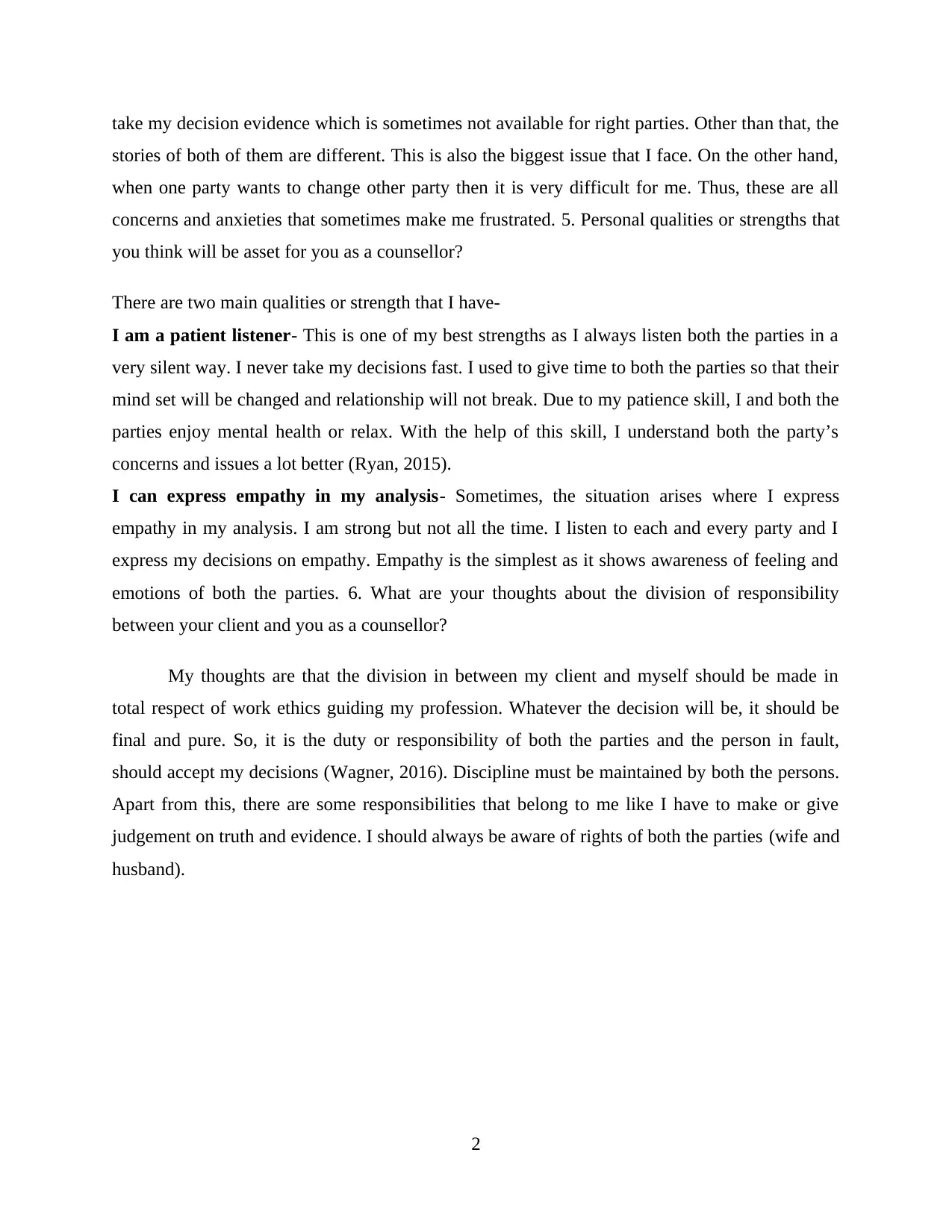
take my decision evidence which is sometimes not available for right parties. Other than that, the
stories of both of them are different. This is also the biggest issue that I face. On the other hand,
when one party wants to change other party then it is very difficult for me. Thus, these are all
concerns and anxieties that sometimes make me frustrated. 5. Personal qualities or strengths that
you think will be asset for you as a counsellor?
There are two main qualities or strength that I have-
I am a patient listener- This is one of my best strengths as I always listen both the parties in a
very silent way. I never take my decisions fast. I used to give time to both the parties so that their
mind set will be changed and relationship will not break. Due to my patience skill, I and both the
parties enjoy mental health or relax. With the help of this skill, I understand both the party’s
concerns and issues a lot better (Ryan, 2015).
I can express empathy in my analysis- Sometimes, the situation arises where I express
empathy in my analysis. I am strong but not all the time. I listen to each and every party and I
express my decisions on empathy. Empathy is the simplest as it shows awareness of feeling and
emotions of both the parties. 6. What are your thoughts about the division of responsibility
between your client and you as a counsellor?
My thoughts are that the division in between my client and myself should be made in
total respect of work ethics guiding my profession. Whatever the decision will be, it should be
final and pure. So, it is the duty or responsibility of both the parties and the person in fault,
should accept my decisions (Wagner, 2016). Discipline must be maintained by both the persons.
Apart from this, there are some responsibilities that belong to me like I have to make or give
judgement on truth and evidence. I should always be aware of rights of both the parties (wife and
husband).
2
stories of both of them are different. This is also the biggest issue that I face. On the other hand,
when one party wants to change other party then it is very difficult for me. Thus, these are all
concerns and anxieties that sometimes make me frustrated. 5. Personal qualities or strengths that
you think will be asset for you as a counsellor?
There are two main qualities or strength that I have-
I am a patient listener- This is one of my best strengths as I always listen both the parties in a
very silent way. I never take my decisions fast. I used to give time to both the parties so that their
mind set will be changed and relationship will not break. Due to my patience skill, I and both the
parties enjoy mental health or relax. With the help of this skill, I understand both the party’s
concerns and issues a lot better (Ryan, 2015).
I can express empathy in my analysis- Sometimes, the situation arises where I express
empathy in my analysis. I am strong but not all the time. I listen to each and every party and I
express my decisions on empathy. Empathy is the simplest as it shows awareness of feeling and
emotions of both the parties. 6. What are your thoughts about the division of responsibility
between your client and you as a counsellor?
My thoughts are that the division in between my client and myself should be made in
total respect of work ethics guiding my profession. Whatever the decision will be, it should be
final and pure. So, it is the duty or responsibility of both the parties and the person in fault,
should accept my decisions (Wagner, 2016). Discipline must be maintained by both the persons.
Apart from this, there are some responsibilities that belong to me like I have to make or give
judgement on truth and evidence. I should always be aware of rights of both the parties (wife and
husband).
2
Paraphrase This Document
Need a fresh take? Get an instant paraphrase of this document with our AI Paraphraser
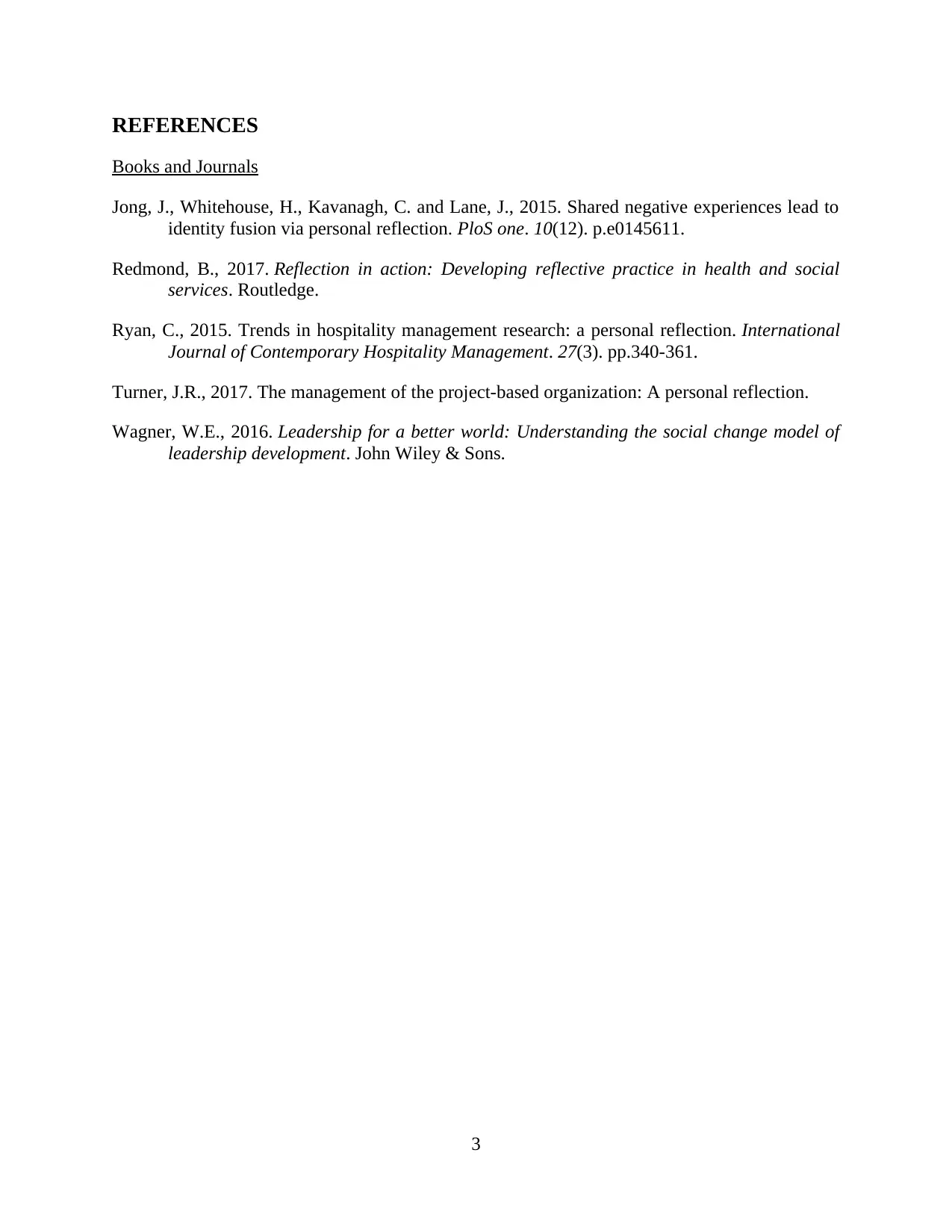
REFERENCES
Books and Journals
Jong, J., Whitehouse, H., Kavanagh, C. and Lane, J., 2015. Shared negative experiences lead to
identity fusion via personal reflection. PloS one. 10(12). p.e0145611.
Redmond, B., 2017. Reflection in action: Developing reflective practice in health and social
services. Routledge.
Ryan, C., 2015. Trends in hospitality management research: a personal reflection. International
Journal of Contemporary Hospitality Management. 27(3). pp.340-361.
Turner, J.R., 2017. The management of the project-based organization: A personal reflection.
Wagner, W.E., 2016. Leadership for a better world: Understanding the social change model of
leadership development. John Wiley & Sons.
3
Books and Journals
Jong, J., Whitehouse, H., Kavanagh, C. and Lane, J., 2015. Shared negative experiences lead to
identity fusion via personal reflection. PloS one. 10(12). p.e0145611.
Redmond, B., 2017. Reflection in action: Developing reflective practice in health and social
services. Routledge.
Ryan, C., 2015. Trends in hospitality management research: a personal reflection. International
Journal of Contemporary Hospitality Management. 27(3). pp.340-361.
Turner, J.R., 2017. The management of the project-based organization: A personal reflection.
Wagner, W.E., 2016. Leadership for a better world: Understanding the social change model of
leadership development. John Wiley & Sons.
3
1 out of 5
Related Documents
Your All-in-One AI-Powered Toolkit for Academic Success.
+13062052269
info@desklib.com
Available 24*7 on WhatsApp / Email
![[object Object]](/_next/static/media/star-bottom.7253800d.svg)
Unlock your academic potential
Copyright © 2020–2026 A2Z Services. All Rights Reserved. Developed and managed by ZUCOL.




